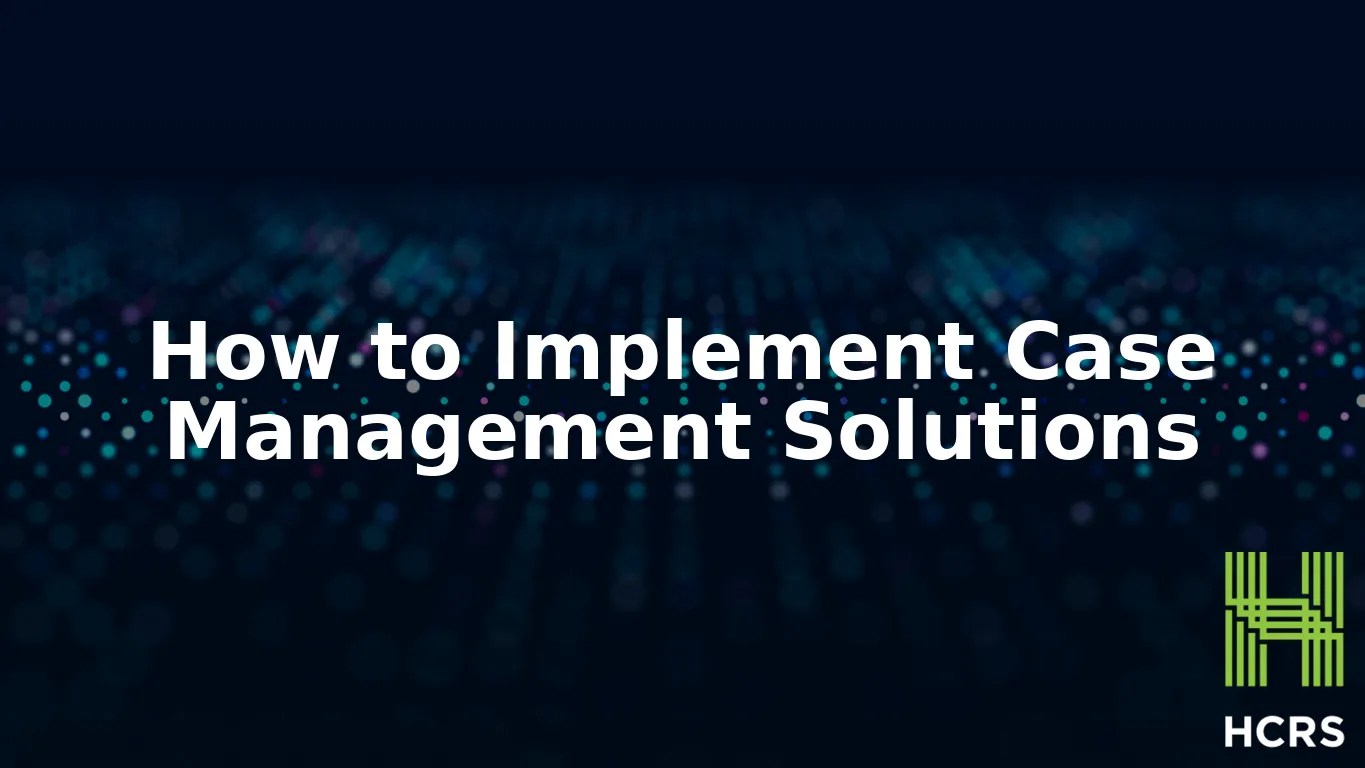
How to Implement Case Management Solutions
Implementing case management solutions is essential for healthcare providers aiming to improve patient outcomes, streamline operations, and reduce costs. A well-structured case management program ensures efficient care delivery, enhances collaboration among care teams, and addresses patient needs proactively.
At HealthCare Resolution Services (HCRS), we help healthcare organizations implement customized case management solutions designed to optimize care and achieve measurable results.
What Is Case Management in Healthcare?
Case management is a collaborative process that assesses, plans, coordinates, and monitors patient care to achieve optimal outcomes. It focuses on addressing individual patient needs while maximizing resource efficiency.
By implementing case management solutions, healthcare organizations can:
- Reduce hospital readmissions
- Enhance care coordination
- Optimize resource utilization
- Improve patient satisfaction
Steps to Implement Case Management Solutions
Conduct a Comprehensive Needs Assessment
Begin by evaluating your organization’s current processes and identifying gaps in care coordination, resource management, and patient engagement.Define Goals and Objectives
Establish clear, measurable goals for your case management program, such as reducing costs, improving patient outcomes, or enhancing compliance with healthcare regulations.Develop a Case Management Framework
Create a structured framework that outlines workflows, team roles, and responsibilities for managing patient care.Choose the Right Case Management Software
Invest in technology that streamlines case management processes, including features such as:- Patient record management
- Automated alerts and reminders
- Reporting and analytics tools
- Interoperability with other systems
Hire and Train Case Managers
Recruit qualified case managers and provide them with ongoing training to ensure they are equipped with the skills and knowledge to succeed.Create Patient-Centered Care Plans
Develop individualized care plans tailored to each patient’s unique needs, preferences, and health goals.Facilitate Team Collaboration
Promote seamless communication and collaboration among care teams, patients, and external providers.Monitor and Evaluate Program Performance
Use data-driven insights to track the success of your case management program and make adjustments as needed to meet organizational goals.
Challenges in Implementing Case Management Solutions
While case management offers numerous benefits, implementing it can present challenges, including:
- Resource Limitations: Balancing the time, budget, and personnel needed for a successful rollout.
- Staff Resistance: Overcoming reluctance to adopt new processes or technologies.
- Data Integration Issues: Ensuring seamless interoperability between case management systems and existing healthcare technology.
- Measuring Impact: Defining and tracking meaningful metrics to evaluate success.
With expert guidance from HCRS, these challenges can be mitigated, ensuring a smooth implementation process.
Benefits of Implementing Case Management Solutions
Improved Patient Outcomes
Coordinated, personalized care plans lead to better health results for patients.Operational Efficiency
Streamlined workflows reduce administrative burdens and enhance productivity.Cost Reduction
Effective resource management lowers healthcare costs by preventing unnecessary hospitalizations and reducing duplicative services.Enhanced Compliance
Structured case management programs help organizations adhere to regulatory requirements and standards.Increased Patient Satisfaction
Patients benefit from proactive, patient-centered care that meets their individual needs.
How HCRS Helps Implement Case Management Solutions
We provide end-to-end support for implementing case management solutions, including:
- Needs Assessments: We analyze current workflows to identify gaps and areas for improvement.
- Program Design: We develop a tailored framework that aligns with your organization’s goals.
- Technology Integration: We recommend and implement case management software to enhance efficiency.
- Training and Development: We equip your team with the skills needed to excel in case management roles.
- Ongoing Monitoring: We provide continuous support to ensure long-term program success.
Frequently Asked Questions
Q: How long does it take to implement a case management solution?
A: Implementation timelines vary based on the organization’s size and complexity, but most programs can be operational within 3-6 months.
Q: Can case management solutions be scaled for smaller healthcare practices?
A: Yes, case management solutions are flexible and can be tailored to meet the needs of small and large healthcare organizations alike.
Q: What metrics should we track to evaluate the success of a case management program?
A: Common metrics include hospital readmission rates, patient satisfaction scores, cost savings, and care coordination efficiency.
Start Implementing Case Management Solutions Today
Implementing case management solutions is a strategic move to improve care delivery, enhance patient outcomes, and achieve operational excellence. We provide the expertise and tools your organization needs for a successful implementation.
Contact us today to learn more about how we can help you implement effective case management solutions.
